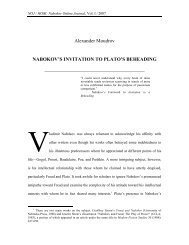domesticated translation: the case of nabokov's translation of alice's
domesticated translation: the case of nabokov's translation of alice's
domesticated translation: the case of nabokov's translation of alice's
You also want an ePaper? Increase the reach of your titles
YUMPU automatically turns print PDFs into web optimized ePapers that Google loves.
NOJ / НОЖ: Nabokov Online Journal, Vol. II / 2008<br />
nationality <strong>of</strong> <strong>the</strong> Mouse is supposed to be French but <strong>the</strong> identity <strong>of</strong> <strong>the</strong> character whom<br />
<strong>the</strong> Mouse followed to <strong>the</strong> shore appears to be Russian.<br />
Edwin and Morcar, <strong>the</strong> Earls <strong>of</strong> Mercia and Northumbria, Stigand, and <strong>the</strong><br />
Archbishop <strong>of</strong> Canterbury disappear in Nabokov’s <strong>translation</strong> and are replaced with<br />
Monomakh’s son, Mstislav, and <strong>the</strong> grand prince Olegovich.<br />
All cultural references indicating that <strong>the</strong> story is set in Britain are deliberately<br />
omitted in Nabokov’s <strong>translation</strong> and this practice includes, quite consistently, <strong>the</strong> names<br />
<strong>of</strong> all characters. In order to make it easier for <strong>the</strong> reader to identify with <strong>the</strong> main<br />
characters and to avoid alienation throughout <strong>the</strong> reading process, Nabokov decided to<br />
Russify English personal names. As Christiana Nord points out, just a quick glance at <strong>the</strong><br />
translated text reveals that translators <strong>of</strong>ten substitute, transcribe and omit names (2003:<br />
182). Obviously, <strong>the</strong> presence <strong>of</strong> foreign names in a <strong>translation</strong> brings with it <strong>the</strong> risk <strong>of</strong><br />
creating a linguistic barrier for young readers. According to Tymoczko, <strong>the</strong> referential<br />
function <strong>of</strong> <strong>the</strong> names presupposes <strong>the</strong>ir “recognizability” and “memorability” because<br />
<strong>the</strong>y must “in some way be memorable so as to serve <strong>the</strong>ir function as indicators <strong>of</strong><br />
unique objects” (1999: 225).<br />
It is clear that unfamiliar foreign names may be difficult for children to recognize<br />
and memorize. On <strong>the</strong> o<strong>the</strong>r hand, names are an important part <strong>of</strong> <strong>the</strong> original text as <strong>the</strong>y<br />
<strong>of</strong>ten carry out <strong>the</strong> function <strong>of</strong> characterizing a person or a place. A translator, <strong>the</strong>refore,<br />
has to make a decision to ei<strong>the</strong>r find a completely new name or keep it <strong>the</strong> same as in <strong>the</strong><br />
original.<br />
It would be an impossible task to preserve all personal allusions in <strong>the</strong> Russian<br />
language, <strong>the</strong>refore Nabokov used <strong>the</strong> substitution strategy and tried preserving <strong>the</strong>
















